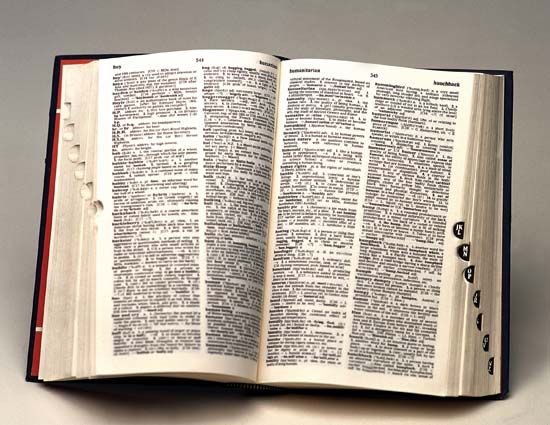lexicography
lexicography, the compiling, editing, or writing of a dictionary. It is distinct from lexicology, the study of the words in a given language, including their origins, evolution, meanings, usage, and contexts.
History of lexicography
The history of lexicographical practices can be traced back to about 3200 bce, when Sumerians began compiling word lists in cuneiform writing on clay tablets to teach literacy. The history of English lexicography dates back to the expansion of Latin Christianity into England (beginning at the end of the 6th century ce), when English-speaking priests and monks needed to learn Latin to read the Bible and conduct services in the liturgical language. In 1218 John of Garland, an English-born Parisian teacher, coined the word dictionarius (Latin: “of or pertaining to words”) as a title for an elementary Latin textbook. The first examples of modern, comprehensive English dictionaries came in the 18th century. A Dictionary of the English Language, Samuel Johnson’s seminal work in precision of definition and organization, was published in 1755. It included quotations and prescriptive commentaries about word usage.
Practical and theoretical lexicography
Lexicography is divided into two fields: practical and theoretical. Practical lexicography is concerned with compiling, writing, and editing dictionaries. Practical lexicographers focus on creating user-friendly dictionaries with accurate, up-to-date, and comprehensive information. Theoretical lexicography, also called metalexicography, is concerned with dictionary research. Theoretical lexicographers focus on researching structural and semantic relationships among words in current dictionaries to improve information organization and structure in future dictionaries. They often focus their research on specific types of dictionaries or elements of a dictionary’s compilation.
Types of dictionaries
The different types of dictionaries are vast and varied. In addition to what are considered “general purpose” dictionaries and language learners’, or bilingual, dictionaries, there are specialized dictionaries, including etymological, pronunciation, and usage dictionaries. Some dictionaries focus on the vocabulary of specific fields of knowledge—e.g., biology, psychology, law, medicine, religion, literature, economics, and fine arts.
Practical lexicographical processes
Lexicographers continually track language by reading books, newspapers, industry-specific journals, online corpora, social media, and any text in which they might discover a new word or a new use for an already recorded word. When lexicographers encounter a new word or usage, they create a citation in a searchable database, noting the word’s context and source. Then they search other databases of words from numerous different sources, including everything from articles to popular literature to song lyrics to speeches. Using these databases, they determine if a word meets certain criteria for inclusion in a dictionary—such as frequent, widespread, and meaningful use. If a word meets the criteria, lexicographers draft a definition for the word and forward it to a series of editors for review. Once the word and definition are approved, they are entered into the system, reviewed by a copy editor, proofread, and added to a dictionary.
Lexicography in the digital age
The shift to digital dictionaries has added a new dimension to the way lexicographers write definitions and structure digital dictionary entries. Web analytics allow lexicographers to see which words users look up more frequently, and the lexicographers can spend more time revising the definitions of those words. Because digital dictionaries are interactive, when lexicographers write definitions, they consider where to place explanatory hyperlinks and how to structure entries for online presentation, sometimes breaking up paragraphs into individual lines.










